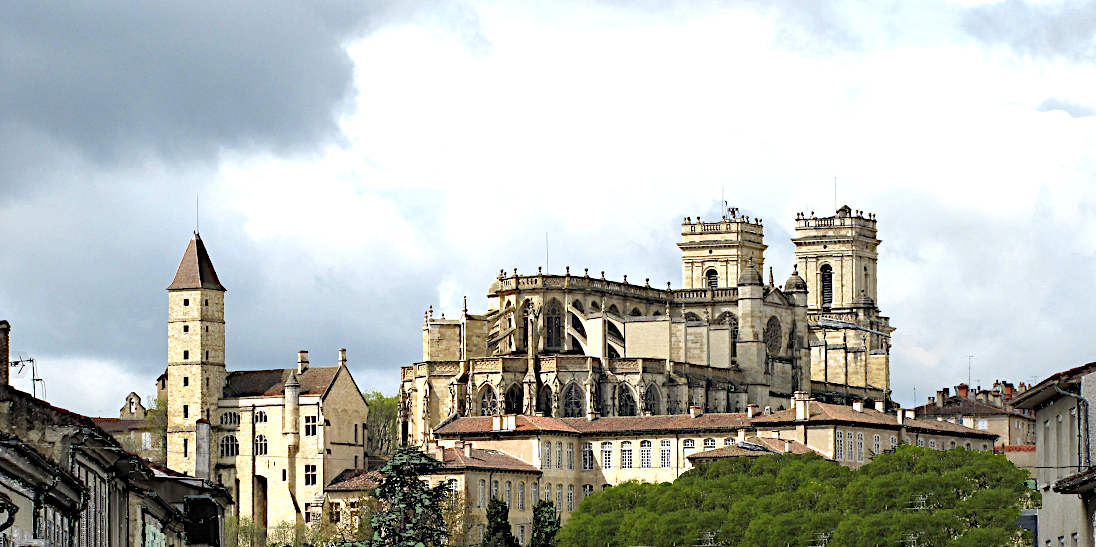
Gascony - an area guide
An inside guide
to Gascony - what to see and do
About-France.com
- the connoisseur's guide to France
Away
from the
crowds, Gascony is an area of France renowned for its gentle
landscapes, its slow
pace of life, and its good food.
| ► Go to... | About Gascony | Main tourist attractions |
Map of Gascony: click markers to see what's where.
The name sounds similar to Tuscany, and indeed the two regions, one in France, the other in Italy, lie at much the same latitude. But Tuscany is more Mediterranean and drier, Gascony is gentler and more rural.
The big problem with Gascony is that it no longer exists on the map of modern France. It is not a clearly defined entity, but an area whose borders and territories have changed over time. In today's France, Gascony is neither a region nor a department, and actually spreads over two regions.
It's fairly clear where the heart of Gascony is located; it's more or less the modern-day French departments of the Gers (capital Auch - See on map), the Landes (capital Mont-de-Marsan - See on map), and the Hautes Pyrénées (capital Tarbes - See on map). To the west, it is bordered by the Atlantic ocean, and to the south by the Pyrenees and Spanish border. But not all of the western Pyrenees are considered to be part of Gascony. The Basque Country ( See on map) is not considered to be part of Gascony, even if the words Basque and Gascon both derive from the same etymological root.
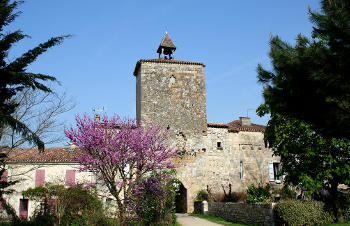 Village
of
Fourcès, in the Gers
Village
of
Fourcès, in the Gers So while on the modern map there is no such area as Gascony, the name is increasingly used in the language of tourism and culture, to designate the southwest corner of France between the Atlantic, the Spanish border, and the valley of the Garonne - excluding the Basque country in the extreme southwest. This more or less corresponds to the corner of France in which, less than two hundred years ago, most of the people still spoke the distinctive Gascon dialect of Languedocian French.
In administrative terms, the land that was once Gascony is divided between two historic regions, Aquitaine and Midi-Pyrenees , now called Nouvelle Aquitaine and Occitanie following the reorganisation of French regions that took place in 2016.
Gourmet Gascony
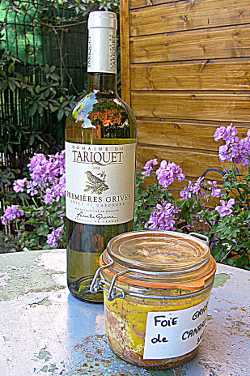 For
foodies, Gascony is well known as one of the great gourmet regions of
France.
For
foodies, Gascony is well known as one of the great gourmet regions of
France.
Its most famous product is undoubtedly Armagnac, the local brandy from the Armagnac area See on map , which is known worldwide as a serious competitor to Cognac (which comes from a bit further north). Gascony also produces some fine wines such as Côtes-de-Gascogne, Madiran, or the very distinctive Pacherenc-du-Vic-Bilh.
As for its cuisine, Gascony is noted for its poultry, and produces some of the best free-range poultry in France. It is also famed for its patés, notably duck paté de foie gras. A popular Gascon speciality in restaurants is croustade, which is can either be a meat or meat and vegetable pie, or an apple pie
And to dispel the myth that Gascony is an area whose agriculture remains rooted in the past , Gascony also grows a third of all the popcorn produced in Europe.
If Gascony is taken to include all the area up to the Gironde estuary, then it also takes in some of the finest vineyards in France, those of the Médoc See on map which include the most prestigious of Grand Cru clarets.
► Discover some of the best hotels with restaurant in the Gers
Reaching Gascony :
By train from Paris Gare de Montparnasse, via Bordeaux and/or ToulouseBy car from the UK: via Orleans, then either the A10 motorway to Bordeaux, or the A71 > A20 motorways to Toulouse.
By plane: Toulouse and Bordeaux airports, and in particular Toulouse, are served by direct flights from the UK and many other parts of Europe. There are also flights to Pau
Main tourist attractions in Gascony
Gers and east
- Auch : See
on map
the departmental capital of the Gers sees itself as the capital of
Gascony. The top sites include the 16th century Sainte-Marie
cathedral , which has a fine organ and early 16th
century
stained-glass windows. Next to it stands the Tour d'Armagnac
– a
14th-century prison, and a statue of "d'Artagnan ", the famous but
fictitious leader of the Three Musketeers. A monumental stairway leads
up to the Cathedral from the banks of the Gers and the lower town.
The tourist office is housed in a particularly fine 15th century half-timbered building.
The Musée des Jacobins contains a fine collection of South-American pre-Columban art - Larresingle : See
on map A
small fortified village near Condom. Just outside the village, from
March to November, there is a outdoor hands-on medieval siege-machines
museum.
Nearby the medieval Pont d'Artigue has for centuries carried pilgrims on their way to Santiago de Compostella over the river Osse. - Montreal
du Gers:
: See on map
delightful small bastide
town, founded in 1255. Surrounded by
vineyards.
Nearby are the remains of the Gallo-Roman villa of Seviac, with some impressive and extensive mosaics. - The Armagnac area. : See on map Famous for its wines and spirits, the Armagnac area lies mostly in the southwest of the Gers..
- Condom : : See on map Historic small town with a 16th century late gothic cathedral, and an Armagnac museum.
- Prehistoric caves of Gargas,: See on map near St. Gaudens (31) Stone age carvings and paintings, that can actually be visited. Underground tour and interpretive centre. Advance reservation is normally essential. See website.
Landes and Gironde
- The forests of Les Landes: The largest expanse of coniferous forest in France. Plenty of opportunities for hiking and cycling, specially along the coast.
- Côte d'Argent: The Atlantic coast - long expanses of sandy coastline, dotted with small tourist resorts.
- Dune du Pyla : See on map the largest sand dunes in Europe, in the Landes de Gascogne regional park, just south of the popular seaside resort of Arcachon
- Zoo du Bassin d'Arcachon. : See on map Close to the Dune du Pyla, this zoo is one of the larger in France, covering a site or around 20 hectares. Many large animals in spacious enclosures
- Chateau-fort de Roquetaillade : See on map 14th century fortified castle, restored in the 19th century by Viollet-le-Duc; located at Mazères, on the borders of Gironde and Landes
Pyrenees
- Pau.: See
on map
Capital of the western Pyrenees; an attractive town, with a fine
castle. The Pau city art gallery, the Musée des Beaux Arts,
has a small
but interesting collection, including works by Rubens,
Zurbaran,
El Greco, Ribera, Corot, Degas, Boudin, Vuillard, Marquet and many
others. Pau is a good centre for exploring the Pyrenees.
- Lourdes. : See on map the most important Catholic pilgrimage centre in France, south of Pau, in the Pyrenees.
- The Pyrenees national park, Alpine mountain area on the Spanish border, including the Cirque de Gavarnie
- Pic du Midi. : See on map At 2877m altitude, the Pic du Midi is one of the highest points in the Pyrenees. Accessible by cablecar from the ski resort of La Mongie at the Col du Tourmalet, one of the great Pyrenean passes frequently on the route of the Tour de France

Sunflowers are a feature of the landscape in the Gers
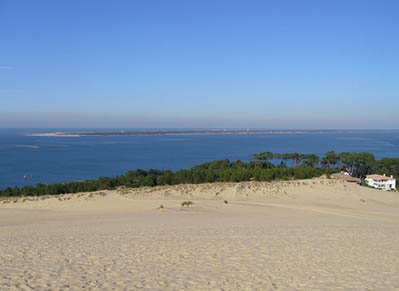
Sand dunes at Arcachon, Gironde
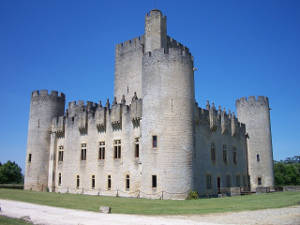
Chateau-fort de Roquetaillade, Gironde
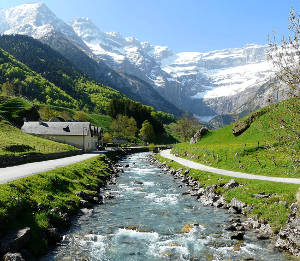
The Cirque de Gavarnie, in the High Pyrenees
About-France.com
Home
page - Site
search
- Regions
- Maps of France
- Contact
Photo
top of page: Auch, capital of the Gers
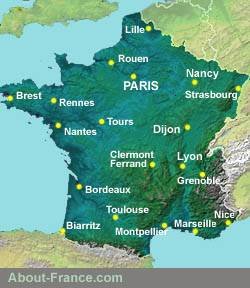

The castle at Pau
Texts Copyright About-France.com 2007 - 2025
Photos About-France.com except when otherwise indicated .
Photo of Fourcès by Jean-Noel Lafargue - Free art licence.
Cirque de Gavarnie - photo by Père Igor
Chateau de Roquetaillade - Florence Pécassou, and
Gourmet Fascony photo by JPS 68
Creative commons licence
Map on an open-source base from Openstreetmap.org
Site
search
About-France.com
What are you looking for ? Where do you want to go?
About-France.com
What are you looking for ? Where do you want to go?
Gascony
, It's not a
region, it was never even a clearly-defined territory in old France ;
but the name Gascony has long been
attached to a large area of the southwest of France, stretching from
the river Garonne to the Pyrenees. Today, it is synonymous with
"douceur de vivre", a relaxed way of life, gentle
countryside,
and fine gourmet cuisine.

| ►► Site guide |
| About-France.com home |
| Full site index |
| About-France.com site search |
| ►► Principal chapters on About-France.com : |
| Guide
to the
regions of France Beyond
Paris, a guide to the French regions and their tourist attractions.
|
| Guide
to Paris Make
the most of your trip to Paris; Information on attractions, Paris
hotels, transport, and lots more.
|
| Accommodation
in France
The different options, including hotels,
holiday gites, b&b, hostels and more
|
| Tourism in France
The
main tourist attractions and places to visit in France - historic
monuments, art galleries, seasides, and more
|
| Planning
a trip to France
Information
on things to do before starting your trip to France.
|
| Driving
in France
Tips
and useful information on driving in and through France - motorways,
tolls, where to stay....
|
| The
French way of
life
A mine of information about
life and living in France, including
working in France, living in France, food and eating, education,
shopping.
|
Click here for
low-cost car hire in France
low-cost car hire in France

The castle at Pau
About-France.com
is an independent and free travel information guide, funded
solely
through affiliate commission that may be earned on bookings made
through selected partner websites.
Texts Copyright About-France.com 2007 - 2025
Photos About-France.com except when otherwise indicated .
Photo of Fourcès by Jean-Noel Lafargue - Free art licence.
Cirque de Gavarnie - photo by Père Igor
Chateau de Roquetaillade - Florence Pécassou, and
Gourmet Fascony photo by JPS 68
Creative commons licence
Map on an open-source base from Openstreetmap.org
